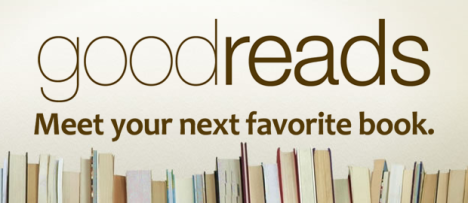I’ve been thinking a lot lately about how much I use the site Goodreads and how it has taken up such a prominent place in my reading practice. I realized I probably check the site at least once every couple days, and I hardly ever miss adding an update of what I’m currently reading or if I’ve finished a book. It’s kind of like that saying, if a tree falls in the forest, etc. If I don’t mark the book as read on Goodreads, then did I really read it?

If you don’t know, Goodreads is what you might call a biblio-social media site: kind of like Facebook for people who like reading. It has a news feed quite similar to Facebook or Twitter where you can get updates from your “friends,” and you can send messages and join groups. My favourite part though—and this may be because of my nerdy librarian tendencies—is the ability to keep track of your books: your to-read, currently reading, and already read lists. You can create shelves to organize your books, named whatever you want like “girls-kicking-ass,” “coming-of-age,” and “especially-excited-about,” just to name a few of my example shelves. For someone who loves finding, organizing, and talking about books perhaps even more than she actually loves reading them, like me, Goodreads is an amazing fun time. Probably the only complaint I have is that there’s no function for cross-referencing books you have on two different shelves—like, there’s no way to figure out which books I have both on my “Canadian” and my “bisexual” shelves, which is kind of a bummer. Or maybe there is and I just haven’t figured it out yet?
The social aspect of the site is great: I’ve built up a network, mixed of people I know “in real life” and strangers who are like-minded queer literary nerds, and I find out about rad new books all the time. The site has an official function where you can recommend books, but I find I mostly just get information from checking out the news feed. It’s not nearly as busy as Facebook, so it’s easier to keep up with. On the news feed, you can see if someone else you know has already read and loved or hated a book you are planning to read, or discover a title you otherwise would have never found. If you look up a book on the site, you’ll also see if anyone on your friends list has reviewed and/or read it, or marked it as to-read / put it on other shelves. Looking at the shelves other people have created sometimes helps me figure out if a book has queer content or not, which can be a frustrating task! Below your friends’ reviews are community reviews from people who aren’t on your friends list—I usually take those reviews with a grain of salt since you have no idea who that person is and what their perspective is.
Especially as far as being a part of a minority group like the LGBTQ+ community goes, I’ve found Goodreads to be an awesome resource. There are only so many LGBTQ+ bookish people that I know in real life, and to be able to crowdsource information, like, “Is it worth it to order this magic realist novel by a trans woman from the US even though it’s kind of expensive?,” from people who I know have similar reading tastes is kind of magical. (That crowdsourcing question is a true story, by the way). Also, I’m not really active in them, but I know there are a bunch of LGBTQ+ themed book clubs / reading groups that you can join on the site too: for example, Transgender Fiction, YA LGBT Books, LGBT Fantasy Fiction, and lots of others!
There was kind of a controversy when Amazon bought Goodreads in 2013. Many were worried about Amazon’s monopoly on online bookselling and information about books. Some were even worried that Amazon would shut the site down or integrate it into a larger one after obtaining all the data they wanted. Given that Goodreads had become a go-to for online book reviews—in contrast to the dismal amount of reviews on Amazon, it seems logical that Amazon wanted to capitalize on that and perhaps squash any potential the site had to direct readers to other online book-buying venues. I’m not sure what options there were on Goodreads before Amazon acquired it, but the webpages of each book do now feature a link to Amazon to buy it, but alongside other options such as Indigo and Barnes and Nobles. Although, the little icon is pretty small and unobtrusive. It’d be a lot more insidious if, say, clicking the cover image led you to Amazon.

The announcement of Amazon buying Goodreads led some people to pursue other biblio-social media options, such as LibraryThing. Book Riot even published a whole list of alternatives to Goodreads the week it was announced. I had actually initially signed up for LibraryThing instead of Goodreads when I was originally looking for a way to keep track of my books online, but was put off when I hit the 200 book mark and they wanted me to pay to add more. To be fair, it’s only $10 a year or $25 for a lifetime membership but I was pretty broke at the time. The other thing is, one of the main benefits of using a biblio-social media site is the sheer amount of people who are on there and part of your crowd-sourcing network. Goodreads has by far the most users.
This is especially relevant if you’re part of a minority group, so there aren’t that many of you to begin with (Is that stat that 10% of the population is LGBTQ+ true? I don’t know): your best option is to be where the most people are. Unless, of course, one site particularly caters to your community or is full of people from your community for some reason—like OkCupid being the go-to online dating site for queer women even though I think other sites like Plenty of Fish probably have more users overall. To my knowledge, none of the current biblio-social media sites have a specific queer bent or have been a place where LGBTQ+ people have congregated. So, for better or for worse, I guess I’m sticking with Goodreads.
Readers, do any of you use biblio-social media sites like Goodreads? What do you like or dislike about them? Do you have any opinions on Amazon buying Goodreads?

 Hi! I’m Casey and I’m an MLIS student and a writer from the west coast of Canada. That means I’m studying to be a librarian and I write about books, libraries, and social media, usually about how they intersect with LGBTQ+, as well as other social justice, issues. If you’re particularly interested in queer books, check out my other blog,
Hi! I’m Casey and I’m an MLIS student and a writer from the west coast of Canada. That means I’m studying to be a librarian and I write about books, libraries, and social media, usually about how they intersect with LGBTQ+, as well as other social justice, issues. If you’re particularly interested in queer books, check out my other blog,